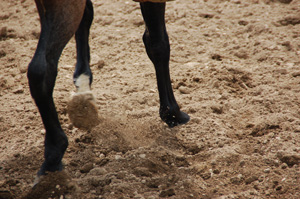 Dear Stacy,
Dear Stacy,
Do I need sliders when training my horse to slide stop? How will they help my horses training?
Thank – you,
Caroline M
Caroline,
It depends on what kind of a ‘slide stop’ you want your horse to have. Most horses can and will slide a little when they stop on certian ground if they are using their hind quarters, maybe a foot or two depending on the horse or the ground. Think of it as if you were running on grass and you decided to try to ‘slide’ to a stop? Which pair of shoes do you own that would help encourage this the most? Proabably a pair that had little to no tread would be best. And would grass or gravel or sand be easier to slide on? Or would it make a difference what the ‘base’ under the footing was? For example as a human it is easy to ‘slide’ on pavement that has small pebbles on it because the pebbles ‘roll’ under foot.
For reining horses we look for footing with a solid smooth base, such as smooth hard packed clay or sand, with a few inches of fluffy (can roll) sand on top. Then we put ‘slider’ on the horse which are smooth back shoes that can be anywhere from 1/2 inch to 1.5 inches wide and smooth. This is like putting on the smooth tread shoes to be able to slide better.
If you don’t let the horses slide with the shoes or you are in ground that won’t slide then you will notice that the horses will have to change the style of the stop. They will have to get in and out of the ground or break to a trot or somehow keep the feet moving during the stop (some horse hop or bounce, etc). It really depends what you are trying to accomplish as to if you need them or not. All my reining horse have them on but my trail horses and kids horses do not. My mounted shooting horse is barefoot now but will have on th 1/2 inch plates in the rear this summer.
You may find this post interesting
http://stacywestfallhorseblog.com/?s=stopping

FREE PDF DOWNLOAD
WHY IS MY HORSE...?
100% Private - 0% Spam
No one taught you the skills you need to work through these things.
Riders often encounter self-doubt, fear, anxiety, frustration, and other challenging emotions at the barn. The emotions coursing through your body can add clarity, or can make your cues indistinguishable for your horse.
Learning these skills and begin communicating clearly with your horse.
Click here to learn more.
